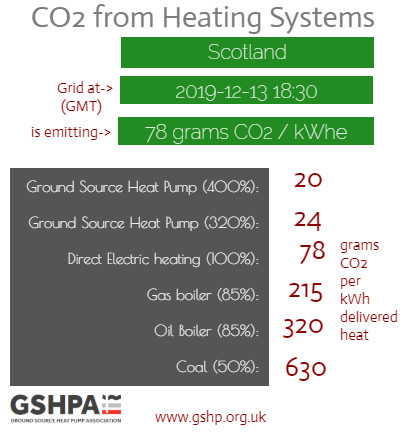Carbon Emissions to be cut by 78% by 2035
The prime minister announced on 20 April 2021 that carbon emissions will be cut by 78% by 2035.
The Climate Change Committee ("CCC") recommended an interim target of 78% reduction in carbon emissions by 2035 on the Balanced Net Zero pathway to 2050. It published its advice to Government for the Sixth Carbon Budget on 9 December 2020.
This followed on from the interim target of 68% reduction in carbon emissions by 2030, compared to 1990 levels, recommended by the CCC and already accepted by Government ahead of the UN climate conference in Glasgow in 2021.

This is a key step closer to achieving Net Zero carbon emissions by 2050.
These annoucements are timed to chime with the 9 December publication of the recommendations of the CCC for the Sixth Carbon Budget – which covers the years from 2033-2037.
It is now five years since the Fifth Carbon Budget was published. It did mention heat pumps and heat networks, but they weren't exactly the main focus.
Fly tipping CO2 into the Atmosphere
Professor Myles Allen of the Climate Dynamics Group of the Department of Physics at Oxford University was asked on Radio 4 on 20 April 2021 who should be expected to pay for the vast cost of decarbonisation in meeting the new carbon reduction targets. He said, "If you cause environmental harm you should undertake to clean up after yourself".
This is the opposite of what happens now in the UK.
The tax on 1 kW of gas burnt in domestic boilers is just 0.43p.
The tax on 1 kW of electricity for domestic heat pumps is 6.01p.
Thus the goverment is inhibiting the installation of electric heat pumps at the same time as it is setting a target
for industry to intall 600,000 heat pumps a year by 2028.
Bedrock of the transition
For the Sixth Carbon Budget the CCC advises that the electrification of heat is "of primary strategic importance" and that oil burners should be phased out by 2028, and gas boilers by 2033. The CCC advises that we should see one million heat pumps being installed each year by 2030 with electricity production becoming Net Zero by 2035.
It is essential that the Government sets a clear commitment to electrification through the 2020s, including stable long-term support to build the heat pump supply chain to deliver emissions reductions.
Chris Stark, CEO of the CCC, said that while he saw a role for pure hydrogen heating in some places, electrified heating such as heat pumps that draw warmth from the environment would need to be "the bedrock of the transition", in large part because of the challenge of making enough hydrogen.
To recap, the only firm policy annoucements we have right now from government on the decarbonisation of heating in homes are:
- Clean Heat Grant Green Homes Grant (just £4,000 per house) which has a budget of just £0.1bn to end March 2024, so that's just £50m a year, or
- Green Homes Grant (£5,000 voucher per house) which is a £2bn scheme, shared with insulation and other things to March 2022. Heat pumps might get just £100m a year.
A quick recap of the carbon budget timeline is shown below:
| October 2008 | The Climate Change Act, which contained the first mentions of the RHI, had a legally binding target of 80% reduction by 2050. | 80% by 2050 |
| November 2015 | Fifth Carbon Budget covered 2028-2032, but it was based on the original 80% reduction by 2050. | 57% by 2030 80% by 2050 |
| May 2019 | CCC estimated the cost of switching to low-carbon heating would be £15bn a year, but didn't say which years that applied to. One estimate is around £4bn for 2028. | 80% by 2050 |
| June 2019 | Theresa May increased the target to 100% Net Zero carbon emissions by 2050. | 100% by 2050 |
| 9 Dec 2020 | Sixth Carbon Budget CCC advice published. | 68% by 2030 78% by 2035 100% by 2050 |
The "environmental levy" on UK electricity inhibits the decarbonisation of heat policy
One key reason to install a ground source heat pumps is that one kilowatt of electricity can be used to transfer 4 kilowatts of heat into your building. This high coefficient of performance of 4 is sadly neutralised by the taxes and levies on electricity that artificially raise the price of electricity to be 4.5 times the price of gas in the UK.
It is the high price of electricity in the UK that is preventing the decarbonisation of heat that is so urgently needed.
See full CCC report on Sixth Carbon Budget
See Renewable Heating See Renewable Cooling



